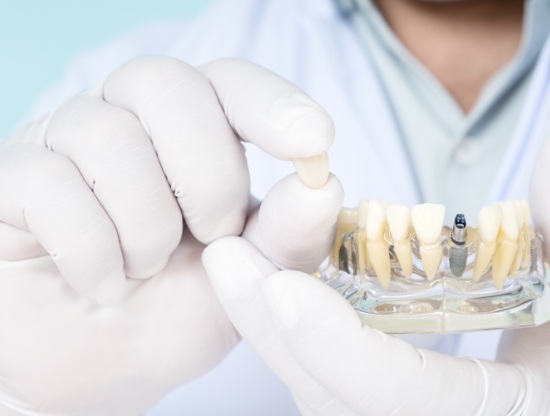Dental Implant Failure & Salvage Rocky Hill
Regain a Strong & Healthy Smile

We often recommend dental implants as the best form of tooth replacement because of the many benefits they offer. Also noteworthy is the fact that this treatment has a remarkably high success rate. However, we also admit that in rare cases, something can go wrong. If you ever believe that you are experiencing dental implant failure in Rocky Hill, Dr. Karpman and our Dental Essentials of Rocky Hill team will do all we can to address the problem and help you regain a strong and healthy smile.
Why Do Dental Implants Fail?

The most common cause of dental implant failure is an infection that goes by the name of peri-implantitis. It occurs when bacteria sneak beneath the gumline and attack the tissue around an implant. Eventually, the infection can become so severe that the implant loses its base of support. Often, poor oral hygiene is a major contributor to the development of peri-implantitis.
Other possible reasons for dental implant failure include:
- Underlying medical conditions, such as some types of cancer
- Failure of the dental implant to bond with the surrounding tissue (failed osseointegration)
- Physical damage, such as that caused by teeth grinding or an accident
Symptoms of a Failed Dental Implant

It is important to note that dental implant failure can occur at any time, even months or years after the initial procedure. For that reason, you should always monitor your oral health and take note of any signs that something could be amiss with your prosthetic teeth.
Here are some indications that you should schedule a dental appointment ASAP:
- You are experiencing unusual pain. After you recover from your dental implant surgery, your implants should not cause any discomfort. Unusual or severe pain is a major red flag.
- One of your implants feels loose. This could be an issue with the implant itself or the restoration on top of it.
- There are signs of an infection. Redness, pus, swelling, and gum recession are all potential signs of peri-implantitis.
- It is difficult for you to chew. Eating with dental implants should be easy and feel natural. Difficulties in this area indicate the need for professional care.
How Dental Implant Salvage Works

You should book an appointment as soon as you notice that something is wrong with one of your implants. The earlier you receive care, the more likely it is that the issue can be addressed via conservative means.
During your appointment, Dr. Karpman will carefully examine your mouth and probably take some X-rays to understand what is happening beneath your gumline. From there, she will be able to recommend your next steps. You might need something as simple as a course of antibiotics or a new restoration. If your case is severe or complex, however, she might refer you to a local oral surgeon so they can remove the failing implant. Later, after a recovery period, you might be eligible to receive an entirely new implant.
